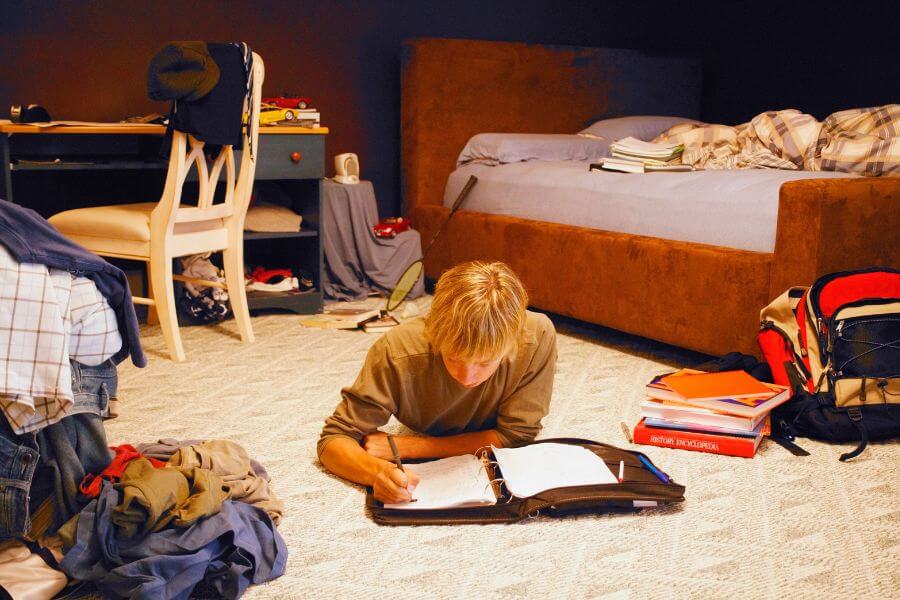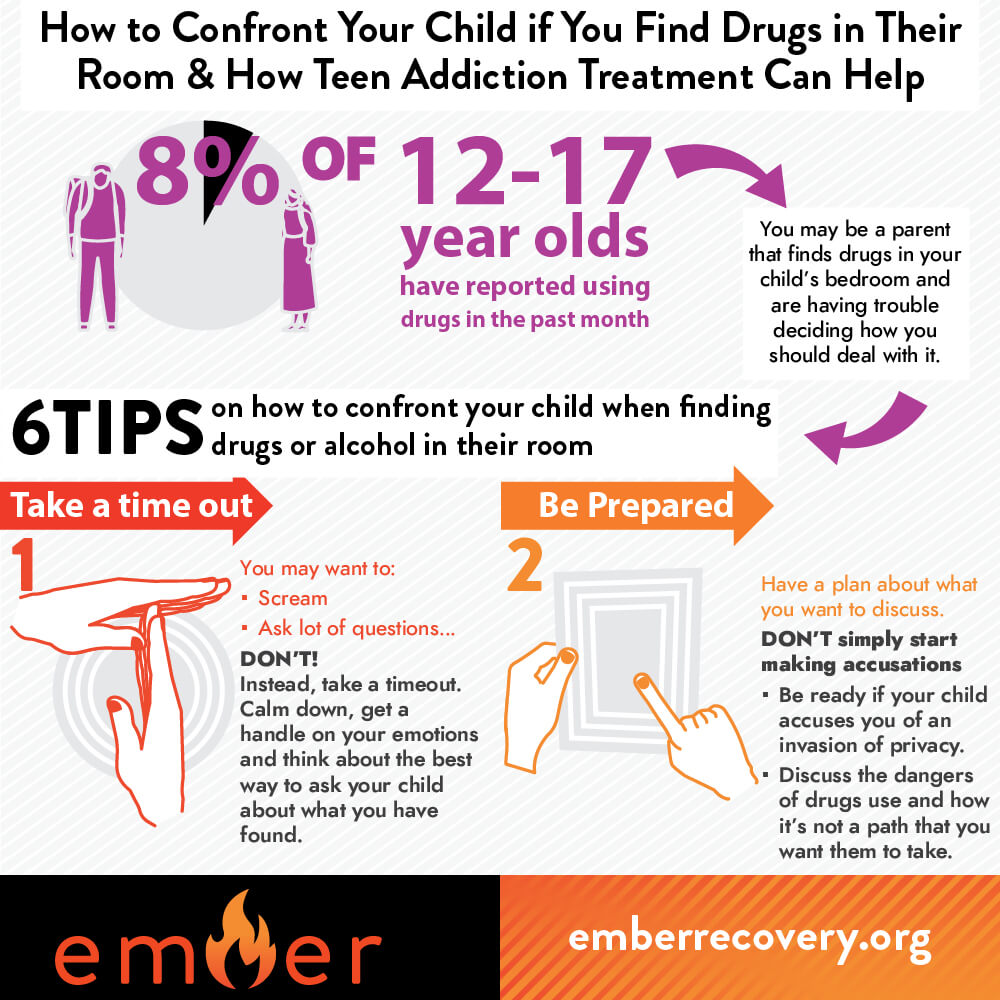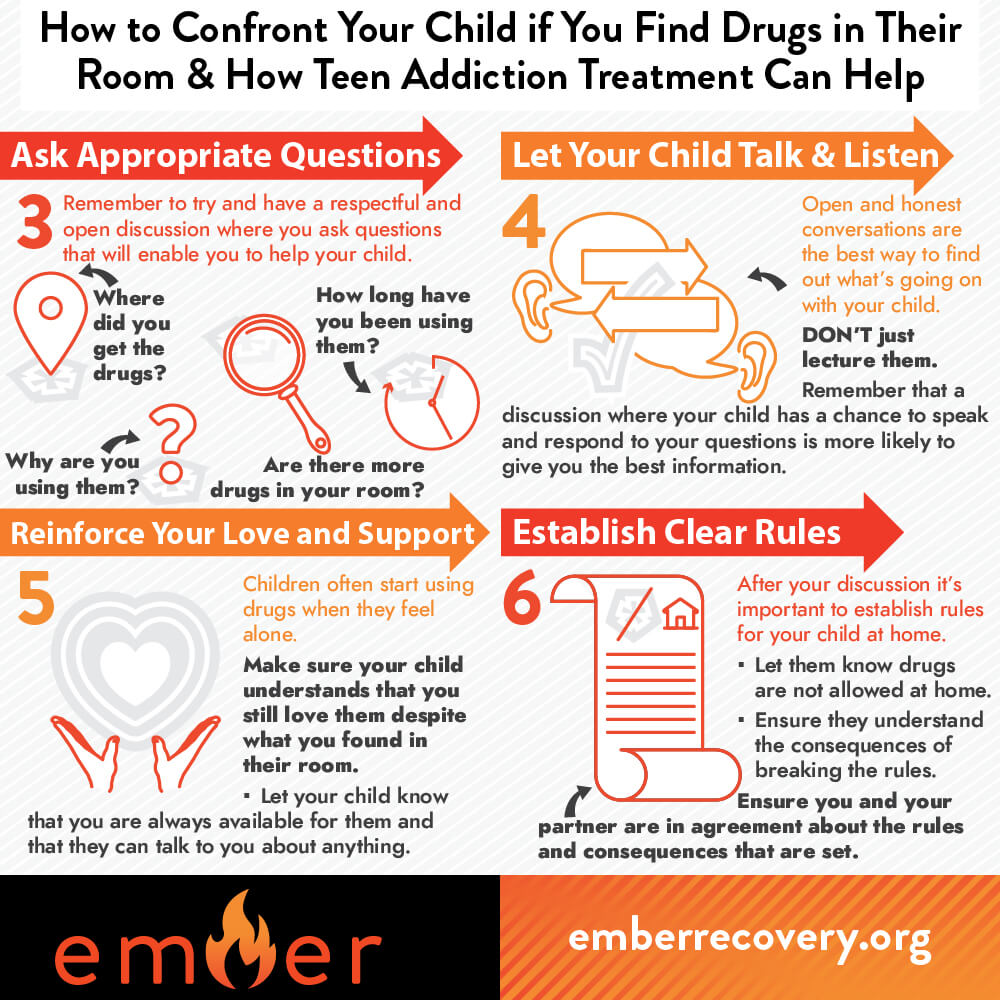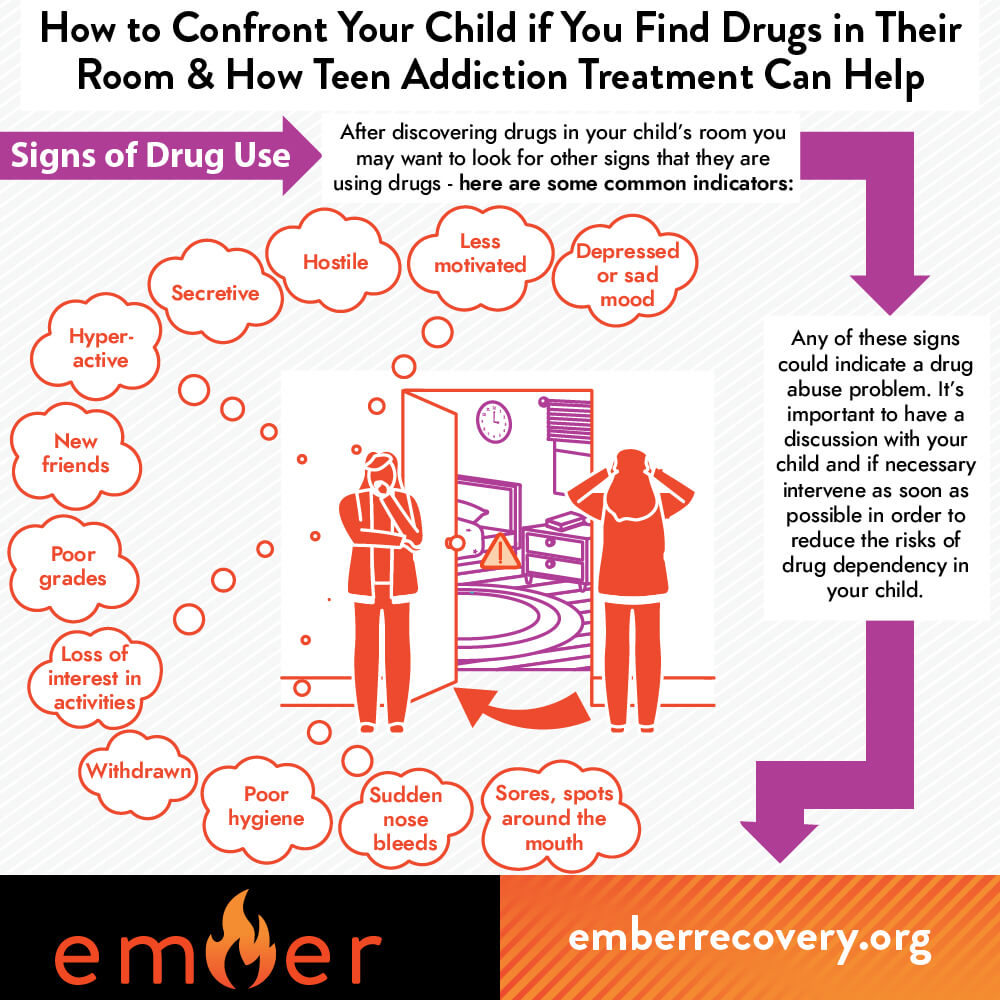Did you know that more than 8% of 12-17 years-olds across the country have reported using drugs in the last month? [1] If your child is part of this group and you’ve recently found drugs in their room, you may be wondering how to confront them. We’re going to share some tips to help with this delicate situation as well as some signs that your child may have a drug problem. You’ll also learn when it may be time to seek teen addiction treatment and how Ember Recovery can help.
6 Tips to Confront Your Child When Finding Drugs or Alcohol in Their Room
Finding drugs in your child’s room can be shocking and upsetting, especially if you had no idea that your child may be using drugs. Consider these six tips to help you confront your child after making this troubling discovery.
Continued after video:
Take a Timeout
Your instant reaction after finding drugs in your child’s room may be to start screaming at them and bombarding them with questions. Instead, take a timeout. All the emotions you are dealing with can be overwhelming and may lead you to say and do things you shouldn’t. Take time to cool down, collect your thoughts, and think about how you’re going to approach them. You’ll thank yourself later.
Be Prepared
Rather than going into the conversation with accusations, develop a plan and be prepared. Your child may lash out at you simply because you were in their room. We all know how big of an issue privacy can be for teenagers. Be ready for this part of the discussion and have some ideas of what you’re going to say.
Your teen may also tell you that the drugs are not theirs. Be prepared for how you’re going to answer them while not being accusatory.
You also want to talk to them about the increased dangers of drug use and how you don’t want them to get on a troubled path. While they may tell you they’ve only tried it once, you want to make it clear that continued drug use can be dangerous and deadly.
Teen Addiction Treatment: Ask Appropriate Questions
After finding drugs in your child’s room, you likely have a long list of questions. Instead of throwing every question at your child at once, think about the most important and appropriate ones you have. These can include:
- Where did you get the drugs?
- How long have you been using them?
- Why are you using them?
- Are there more drugs in your room that I haven’t found?
Asking these questions should give you important answers that can help you better assess what’s going on with your child. Having a respectful and open conversation is the best route to take when you’re trying to help your child.
Let Your Child Talk & Listen
The last thing your child wants is to hear you lecture them. Don’t make it a one-sided conversation. Give your child the opportunity to explain what’s going on, and be sure to listen to what they have to say. They may bring up issues that lead to their drug use that need to be addressed. Many times, parents have no idea what their child may be going through because they don’t have open and honest conversations with them frequently enough.
Teen Addiction Treatment: Reinforce Your Love and Support
Some children start to use drugs because they feel alone. Reinforce your love for your child despite finding drugs in their room. Let them know you are there for them if they need to talk or need any other support. Tell them they should never be afraid to talk openly and honestly with you about anything that is going on in their lives. Knowing they have someone in their corner is important for a child.
Establish Clear Rules
After thoroughly listening to what they have to say, you want to establish clear rules with your child. Let them know what is not allowed in your home and the consequences if your rules are broken. Always be sure that you and your partner are on the same page when it comes to the rules and the consequences of breaking them. Nothing is more confusing for a child than to have different rules from different parents.
Signs of Drug Use
After finding drugs in your child’s room, you may also start to look for signs you may have missed that they are using drugs. Some of these signs include[2]:
- Depressed or sad mood
- Less motivated
- Hostile
- Secretive
- Hyperactive
- New friends
- Poor grades
- Loss of interest in activities
- Withdrawn
- Poor hygiene
- Sudden nosebleeds
- Sores, spots around the mouth
If you begin to notice some of these signs in your child, it could indicate a drug use problem. You’ll want to have a discussion with them to see what is truly going on in their lives. Finding out about drug use early on can get your child the teen addiction treatment they need to get back on track. It is important to intervene early to reduce the risks of drug dependency in your child. Waiting for things to just blow over on their own can be dangerous for your child and lead to increased drug use.
Seek Teen Addiction Treatment at Ember Recovery
Ember Recovery offers the teen addiction treatment your child needs to be drug-free. Our programs have helped over 5,000 teens across Iowa with their substance abuse problems. Let us help your child. By working exclusively with teens, we can help them with problems that are specific to their age group.
Our inpatient drug rehab finds the individualized care that teens need to get on the path to sobriety. We work to tailor each treatment plan to each patient. The team at Ember Recovery provides teens with a home-like atmosphere as they battle their addictions so they can feel as comfortable as possible. We also provide after-care recovery planning to help them succeed once their program is finished. For more information on our programs, contact us today or reach out online.
Sources:
[1] https://drugabusestatistics.org/teen-drug-use/ [2] https://drugfree.org/article/signs-of-drug-use-in-teens/

Andrea Dickerson is a Licensed Therapist and Certified Substance Use Counselor who has worked in behavioral health since 1997. Currently, Andrea is the Director of Behavioral Health, overseeing the Ember residential treatment programs and YSS outpatient counseling clinics throughout Central and North Central Iowa. She became a Motivational Interviewing (MI) trainer in 2006 and provides MI trainings throughout Iowa.
Andrea specializes in working with adolescents and their families and enjoys seeing the family relationships grow through therapy. Andrea is also a CARF International Surveyor, going around North America ensuring behavioral health organizations are meeting required standards.
In her free time, Andrea enjoys cheering on the Iowa Hawkeyes and Chicago Cubs, as well as being an active member of Soroptimist International of the Americas (SIA), a global organization that provides women and girls with access to the education and training they need to achieve economic empowerment. She has been a member of the SI of Des Moines club since 2012 and has been actively involved at the regional level, currently serving as Co-Governor of the Peaks to Plains Region.
Through her involvement in SIA, Andrea has been actively involved in the Dream Programs, coordinating annual Dream It, Be It: Career Support for Girls projects, which give girls the tools they need to achieve their education and career goals, empowering them to break cycles of poverty, violence, and abuse.



